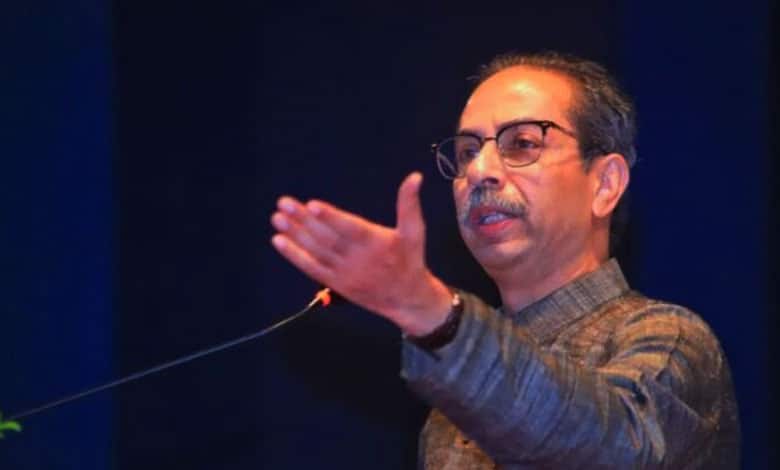Uddhav Thackeray Questions EC on Fadnavis’ Call for ‘Dharma-Yudh of Votes’
Speaking at a campaign rally in Dombivli town of Thane district ahead of the upcoming November 20 state assembly polls, Thackeray questioned whether such rhetoric adheres to the EC's Model Code of Conduct.

Thane: Shiv Sena (UBT) chief Uddhav Thackeray has raised a significant question to the Election Commission (EC) regarding Maharashtra Deputy Chief Minister Devendra Fadnavis’ controversial call for a “dharma-yudh of votes.” Speaking at a campaign rally in Dombivli town of Thane district ahead of the upcoming November 20 state assembly polls, Thackeray questioned whether such rhetoric adheres to the EC’s Model Code of Conduct.
Table of Contents
Thackeray’s Criticism of Election Practices
Uddhav Thackeray highlighted a perceived double standard in the enforcement of election rules. He recalled an earlier incident where he was reportedly asked to remove the slogan “Jai Bhavani, Jai Shivaji” from his party’s election anthem before the Lok Sabha elections. Thackeray resisted the request, citing the cultural and historical significance of the slogan.
In sharp contrast, Thackeray questioned the EC’s silence on Fadnavis’ recent remarks. “Devendra Fadnavis has called for a ‘dharma-yudh of votes.’ I ask the Election Commission, does this align with your Model Code of Conduct?” he said.
Context Behind Fadnavis’ Remarks
Fadnavis made the contentious statement at a rally in Pune, reportedly in response to an appeal by an Islamic scholar advocating for a “vote jihad” against the Mahayuti (Grand Alliance) government in Maharashtra. Fadnavis urged voters to respond with a “dharma-yudh of votes” to counter such appeals, a move that has since drawn sharp criticism from political rivals.
Thackeray’s Vision of Hindutva
Thackeray used the rally as a platform to differentiate his brand of Hindutva from that of the BJP. He asserted, “Our Hindutva ensures stoves are lit in people’s homes. The BJP’s Hindutva, on the other hand, burns those very homes.”
Also Read: CM Revanth seeks decisive mandate for MVA alliance in Maharashtra polls
This statement aligns with Thackeray’s broader critique of the BJP’s governance model, which he claims prioritizes divisive politics and corporate interests over public welfare.
Criticism of BJP’s Leadership and Vision
The Shiv Sena (UBT) leader further accused the BJP of betraying its founding principles. “The BJP that grew from the sacrifices of its workers has now turned into a hybrid organization filled with opportunistic leaders imported from other parties,” he remarked.
Thackeray also lamented the erosion of the legacy of BJP stalwarts like Atal Bihari Vajpayee, Pramod Mahajan, and Gopinath Munde. He criticized the current leadership for prioritizing power over values and accused it of undermining the party’s original vision.
Concern Over Gujarati-Marathi Divide
Another issue raised by Thackeray during his speech was the growing “Gujarati-Marathi divide” in Maharashtra. He alleged that the BJP-led government was contributing to this division to benefit corporate interests.
Allegations of Corruption in Municipal Governance
Thackeray also targeted the BJP and Maharashtra Chief Minister Eknath Shinde-led Shiv Sena over allegations of corruption. He accused the ruling coalition of mismanaging municipal corporations across Thane district and looting public resources.
Shiv Sena (UBT) Positions Itself as an Alternative
As the state assembly polls approach, Thackeray’s remarks reflect a broader strategy to position the Shiv Sena (UBT) as a viable alternative to the BJP-Shinde alliance. By emphasizing his version of Hindutva, questioning the ethics of his political opponents, and raising concerns over governance, Thackeray aims to galvanize support among voters disillusioned with the current administration.
Conclusion
The upcoming assembly elections in Maharashtra have taken a dramatic turn, with sharp rhetoric and ideological clashes dominating campaign speeches. Uddhav Thackeray’s challenge to the Election Commission over Fadnavis’ remarks adds another layer to this unfolding political drama.
As voters head to the polls on November 20, the debate over Hindutva, governance, and the role of the Election Commission in ensuring fair practices will remain central to Maharashtra’s political discourse.
